Australian Commercial Law Assignment: Case Analysis and Solutions
VerifiedAdded on 2021/06/14
|7
|2040
|24
Homework Assignment
AI Summary
This document presents a comprehensive solution to an Australian Commercial Law assignment. Part A analyzes the UK legal system through Hart's framework, focusing on the rule of recognition, rule of change, and rule of adjudication, comparing them with the Australian legal system. Part B addresses a case study involving a grocery business sale, examining the issues of misrepresentation and breach of contract. The analysis delves into fraudulent misrepresentation, the application of the Competition and Consumer Act 2010 (Australian Consumer Law), and implied customer guarantees. The assignment concludes that the contract for the grocery business sale is voidable due to misrepresentation, and the buyer, Barry, can seek remedies under Australian Consumer Law. Furthermore, the assignment determines that the seller's representations are considered terms of the contract, and a breach of these terms allows Barry to claim financial damages.
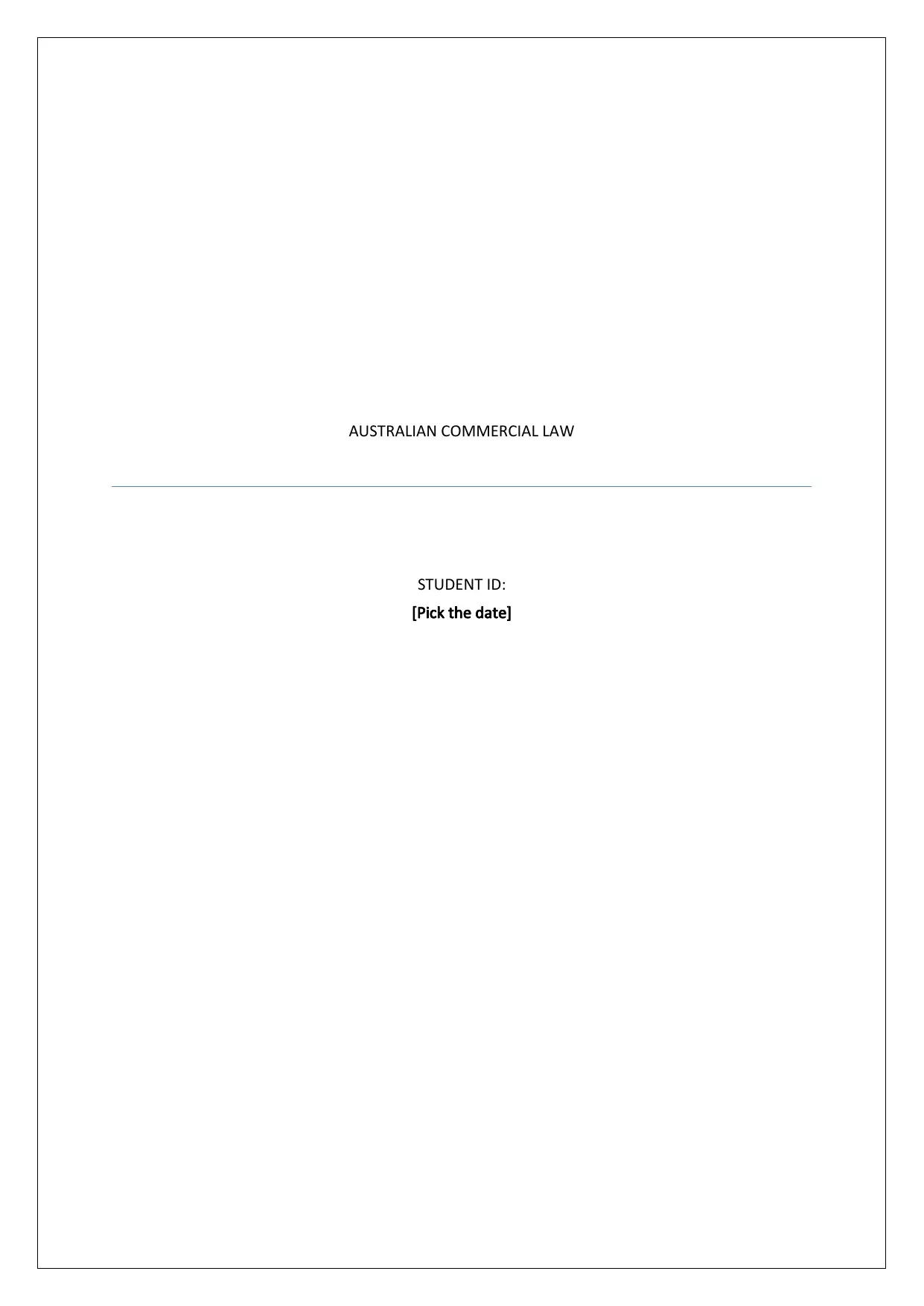
AUSTRALIAN COMMERCIAL LAW
STUDENT ID:
[Pick the date]
STUDENT ID:
[Pick the date]
Paraphrase This Document
Need a fresh take? Get an instant paraphrase of this document with our AI Paraphraser
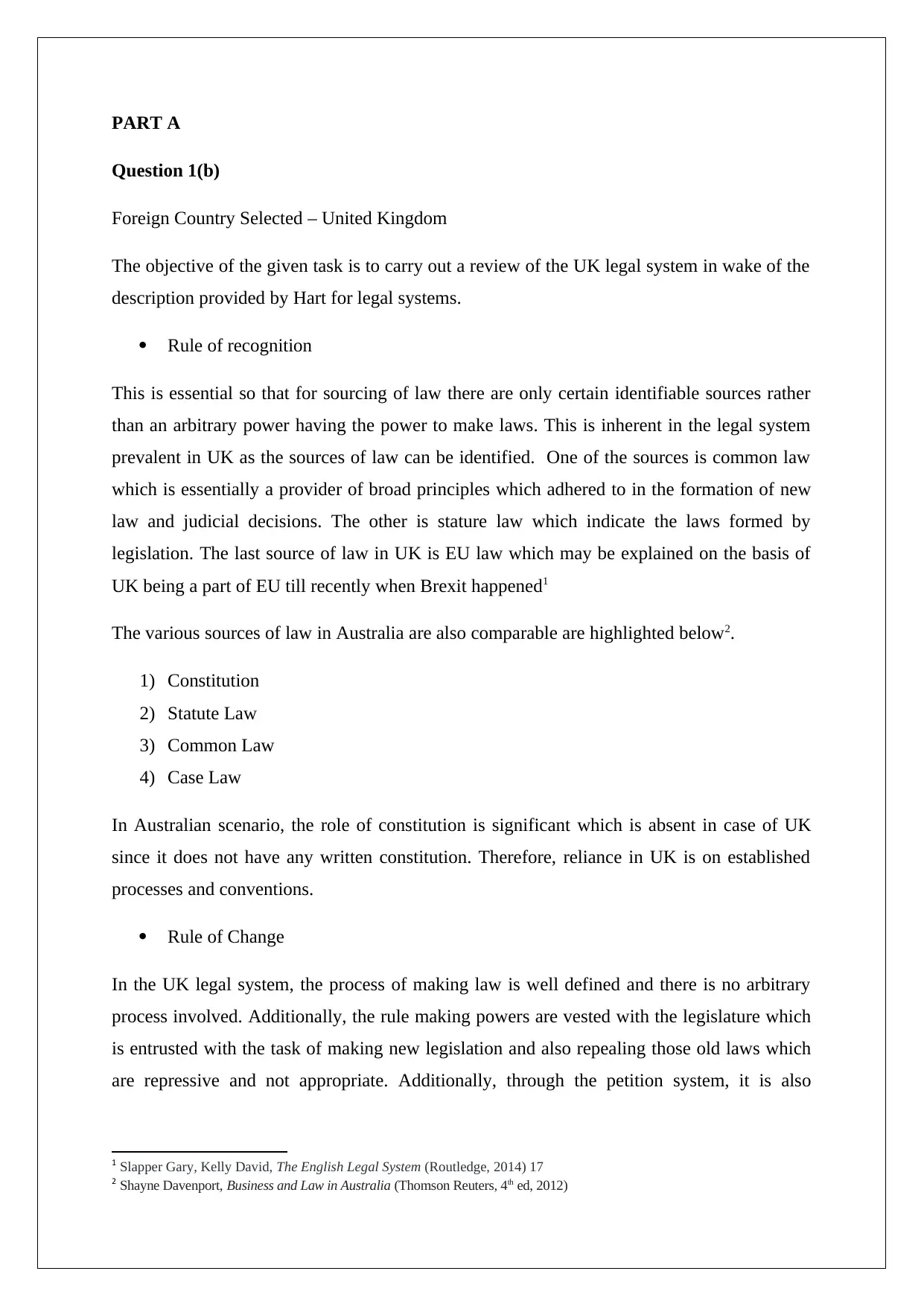
PART A
Question 1(b)
Foreign Country Selected – United Kingdom
The objective of the given task is to carry out a review of the UK legal system in wake of the
description provided by Hart for legal systems.
Rule of recognition
This is essential so that for sourcing of law there are only certain identifiable sources rather
than an arbitrary power having the power to make laws. This is inherent in the legal system
prevalent in UK as the sources of law can be identified. One of the sources is common law
which is essentially a provider of broad principles which adhered to in the formation of new
law and judicial decisions. The other is stature law which indicate the laws formed by
legislation. The last source of law in UK is EU law which may be explained on the basis of
UK being a part of EU till recently when Brexit happened1
The various sources of law in Australia are also comparable are highlighted below2.
1) Constitution
2) Statute Law
3) Common Law
4) Case Law
In Australian scenario, the role of constitution is significant which is absent in case of UK
since it does not have any written constitution. Therefore, reliance in UK is on established
processes and conventions.
Rule of Change
In the UK legal system, the process of making law is well defined and there is no arbitrary
process involved. Additionally, the rule making powers are vested with the legislature which
is entrusted with the task of making new legislation and also repealing those old laws which
are repressive and not appropriate. Additionally, through the petition system, it is also
1 Slapper Gary, Kelly David, The English Legal System (Routledge, 2014) 17
2 Shayne Davenport, Business and Law in Australia (Thomson Reuters, 4th ed, 2012)
Question 1(b)
Foreign Country Selected – United Kingdom
The objective of the given task is to carry out a review of the UK legal system in wake of the
description provided by Hart for legal systems.
Rule of recognition
This is essential so that for sourcing of law there are only certain identifiable sources rather
than an arbitrary power having the power to make laws. This is inherent in the legal system
prevalent in UK as the sources of law can be identified. One of the sources is common law
which is essentially a provider of broad principles which adhered to in the formation of new
law and judicial decisions. The other is stature law which indicate the laws formed by
legislation. The last source of law in UK is EU law which may be explained on the basis of
UK being a part of EU till recently when Brexit happened1
The various sources of law in Australia are also comparable are highlighted below2.
1) Constitution
2) Statute Law
3) Common Law
4) Case Law
In Australian scenario, the role of constitution is significant which is absent in case of UK
since it does not have any written constitution. Therefore, reliance in UK is on established
processes and conventions.
Rule of Change
In the UK legal system, the process of making law is well defined and there is no arbitrary
process involved. Additionally, the rule making powers are vested with the legislature which
is entrusted with the task of making new legislation and also repealing those old laws which
are repressive and not appropriate. Additionally, through the petition system, it is also
1 Slapper Gary, Kelly David, The English Legal System (Routledge, 2014) 17
2 Shayne Davenport, Business and Law in Australia (Thomson Reuters, 4th ed, 2012)
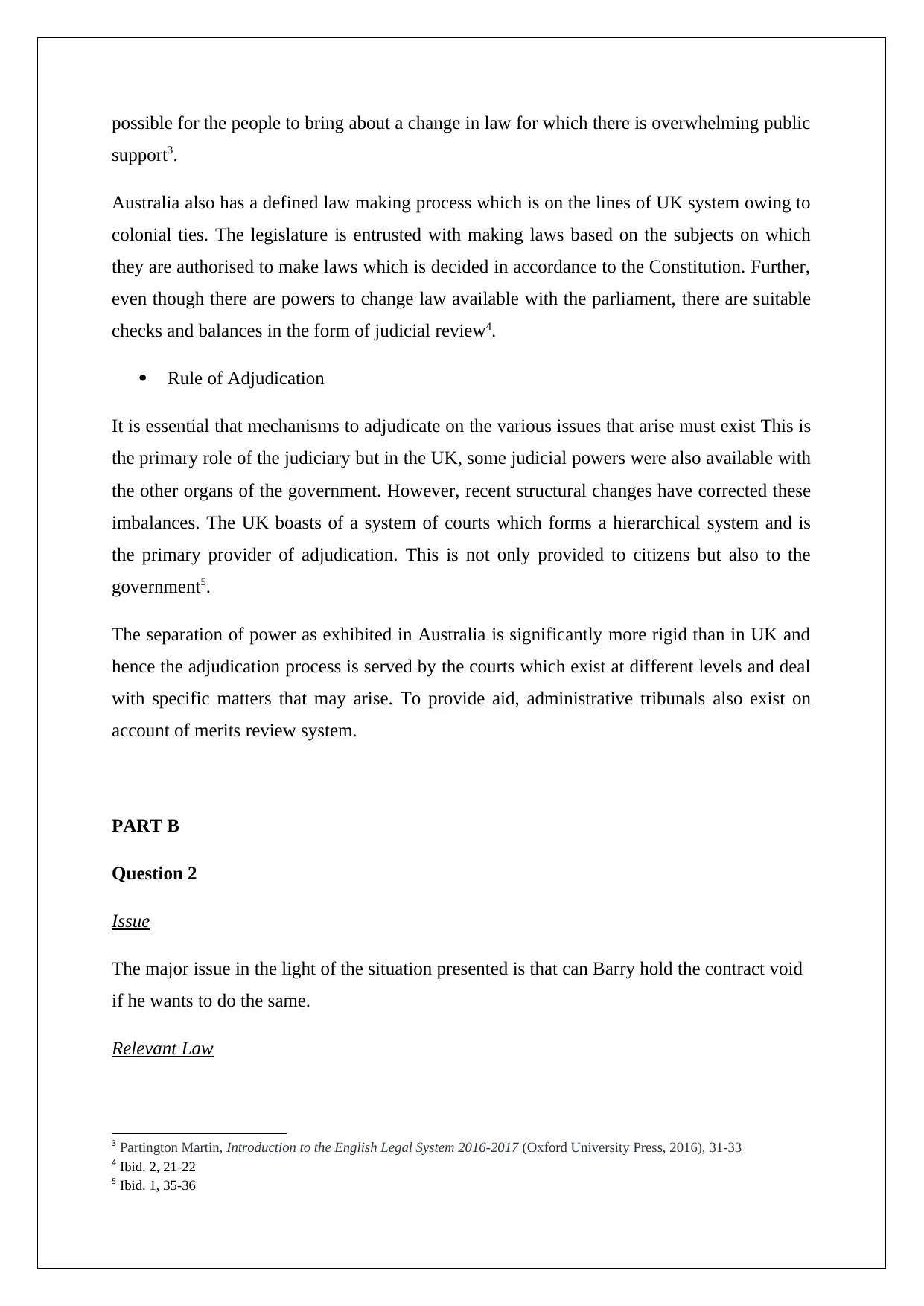
possible for the people to bring about a change in law for which there is overwhelming public
support3.
Australia also has a defined law making process which is on the lines of UK system owing to
colonial ties. The legislature is entrusted with making laws based on the subjects on which
they are authorised to make laws which is decided in accordance to the Constitution. Further,
even though there are powers to change law available with the parliament, there are suitable
checks and balances in the form of judicial review4.
Rule of Adjudication
It is essential that mechanisms to adjudicate on the various issues that arise must exist This is
the primary role of the judiciary but in the UK, some judicial powers were also available with
the other organs of the government. However, recent structural changes have corrected these
imbalances. The UK boasts of a system of courts which forms a hierarchical system and is
the primary provider of adjudication. This is not only provided to citizens but also to the
government5.
The separation of power as exhibited in Australia is significantly more rigid than in UK and
hence the adjudication process is served by the courts which exist at different levels and deal
with specific matters that may arise. To provide aid, administrative tribunals also exist on
account of merits review system.
PART B
Question 2
Issue
The major issue in the light of the situation presented is that can Barry hold the contract void
if he wants to do the same.
Relevant Law
3 Partington Martin, Introduction to the English Legal System 2016-2017 (Oxford University Press, 2016), 31-33
4 Ibid. 2, 21-22
5 Ibid. 1, 35-36
support3.
Australia also has a defined law making process which is on the lines of UK system owing to
colonial ties. The legislature is entrusted with making laws based on the subjects on which
they are authorised to make laws which is decided in accordance to the Constitution. Further,
even though there are powers to change law available with the parliament, there are suitable
checks and balances in the form of judicial review4.
Rule of Adjudication
It is essential that mechanisms to adjudicate on the various issues that arise must exist This is
the primary role of the judiciary but in the UK, some judicial powers were also available with
the other organs of the government. However, recent structural changes have corrected these
imbalances. The UK boasts of a system of courts which forms a hierarchical system and is
the primary provider of adjudication. This is not only provided to citizens but also to the
government5.
The separation of power as exhibited in Australia is significantly more rigid than in UK and
hence the adjudication process is served by the courts which exist at different levels and deal
with specific matters that may arise. To provide aid, administrative tribunals also exist on
account of merits review system.
PART B
Question 2
Issue
The major issue in the light of the situation presented is that can Barry hold the contract void
if he wants to do the same.
Relevant Law
3 Partington Martin, Introduction to the English Legal System 2016-2017 (Oxford University Press, 2016), 31-33
4 Ibid. 2, 21-22
5 Ibid. 1, 35-36
⊘ This is a preview!⊘
Do you want full access?
Subscribe today to unlock all pages.

Trusted by 1+ million students worldwide
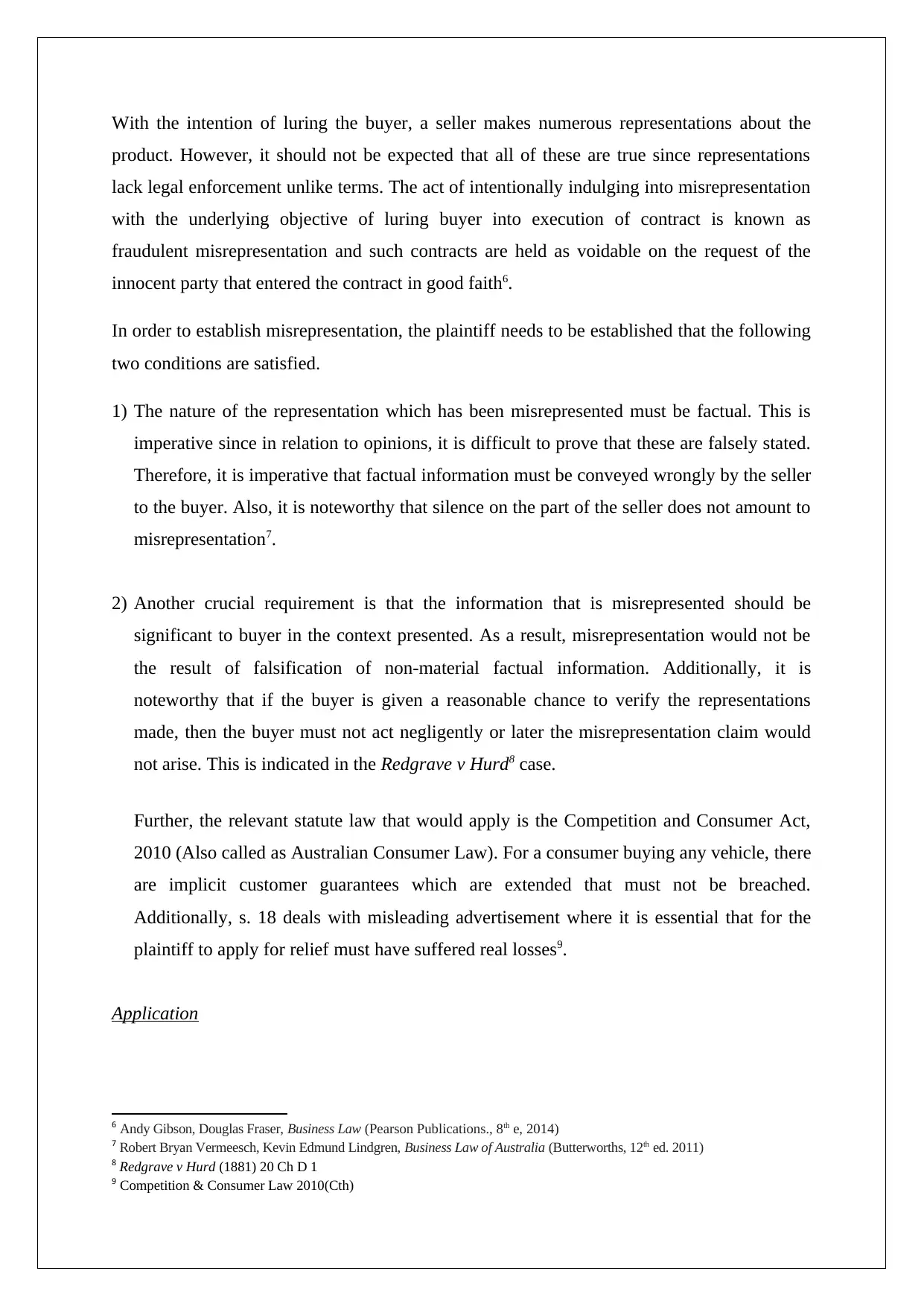
With the intention of luring the buyer, a seller makes numerous representations about the
product. However, it should not be expected that all of these are true since representations
lack legal enforcement unlike terms. The act of intentionally indulging into misrepresentation
with the underlying objective of luring buyer into execution of contract is known as
fraudulent misrepresentation and such contracts are held as voidable on the request of the
innocent party that entered the contract in good faith6.
In order to establish misrepresentation, the plaintiff needs to be established that the following
two conditions are satisfied.
1) The nature of the representation which has been misrepresented must be factual. This is
imperative since in relation to opinions, it is difficult to prove that these are falsely stated.
Therefore, it is imperative that factual information must be conveyed wrongly by the seller
to the buyer. Also, it is noteworthy that silence on the part of the seller does not amount to
misrepresentation7.
2) Another crucial requirement is that the information that is misrepresented should be
significant to buyer in the context presented. As a result, misrepresentation would not be
the result of falsification of non-material factual information. Additionally, it is
noteworthy that if the buyer is given a reasonable chance to verify the representations
made, then the buyer must not act negligently or later the misrepresentation claim would
not arise. This is indicated in the Redgrave v Hurd8 case.
Further, the relevant statute law that would apply is the Competition and Consumer Act,
2010 (Also called as Australian Consumer Law). For a consumer buying any vehicle, there
are implicit customer guarantees which are extended that must not be breached.
Additionally, s. 18 deals with misleading advertisement where it is essential that for the
plaintiff to apply for relief must have suffered real losses9.
Application
6 Andy Gibson, Douglas Fraser, Business Law (Pearson Publications., 8th e, 2014)
7 Robert Bryan Vermeesch, Kevin Edmund Lindgren, Business Law of Australia (Butterworths, 12th ed. 2011)
8 Redgrave v Hurd (1881) 20 Ch D 1
9 Competition & Consumer Law 2010(Cth)
product. However, it should not be expected that all of these are true since representations
lack legal enforcement unlike terms. The act of intentionally indulging into misrepresentation
with the underlying objective of luring buyer into execution of contract is known as
fraudulent misrepresentation and such contracts are held as voidable on the request of the
innocent party that entered the contract in good faith6.
In order to establish misrepresentation, the plaintiff needs to be established that the following
two conditions are satisfied.
1) The nature of the representation which has been misrepresented must be factual. This is
imperative since in relation to opinions, it is difficult to prove that these are falsely stated.
Therefore, it is imperative that factual information must be conveyed wrongly by the seller
to the buyer. Also, it is noteworthy that silence on the part of the seller does not amount to
misrepresentation7.
2) Another crucial requirement is that the information that is misrepresented should be
significant to buyer in the context presented. As a result, misrepresentation would not be
the result of falsification of non-material factual information. Additionally, it is
noteworthy that if the buyer is given a reasonable chance to verify the representations
made, then the buyer must not act negligently or later the misrepresentation claim would
not arise. This is indicated in the Redgrave v Hurd8 case.
Further, the relevant statute law that would apply is the Competition and Consumer Act,
2010 (Also called as Australian Consumer Law). For a consumer buying any vehicle, there
are implicit customer guarantees which are extended that must not be breached.
Additionally, s. 18 deals with misleading advertisement where it is essential that for the
plaintiff to apply for relief must have suffered real losses9.
Application
6 Andy Gibson, Douglas Fraser, Business Law (Pearson Publications., 8th e, 2014)
7 Robert Bryan Vermeesch, Kevin Edmund Lindgren, Business Law of Australia (Butterworths, 12th ed. 2011)
8 Redgrave v Hurd (1881) 20 Ch D 1
9 Competition & Consumer Law 2010(Cth)
Paraphrase This Document
Need a fresh take? Get an instant paraphrase of this document with our AI Paraphraser
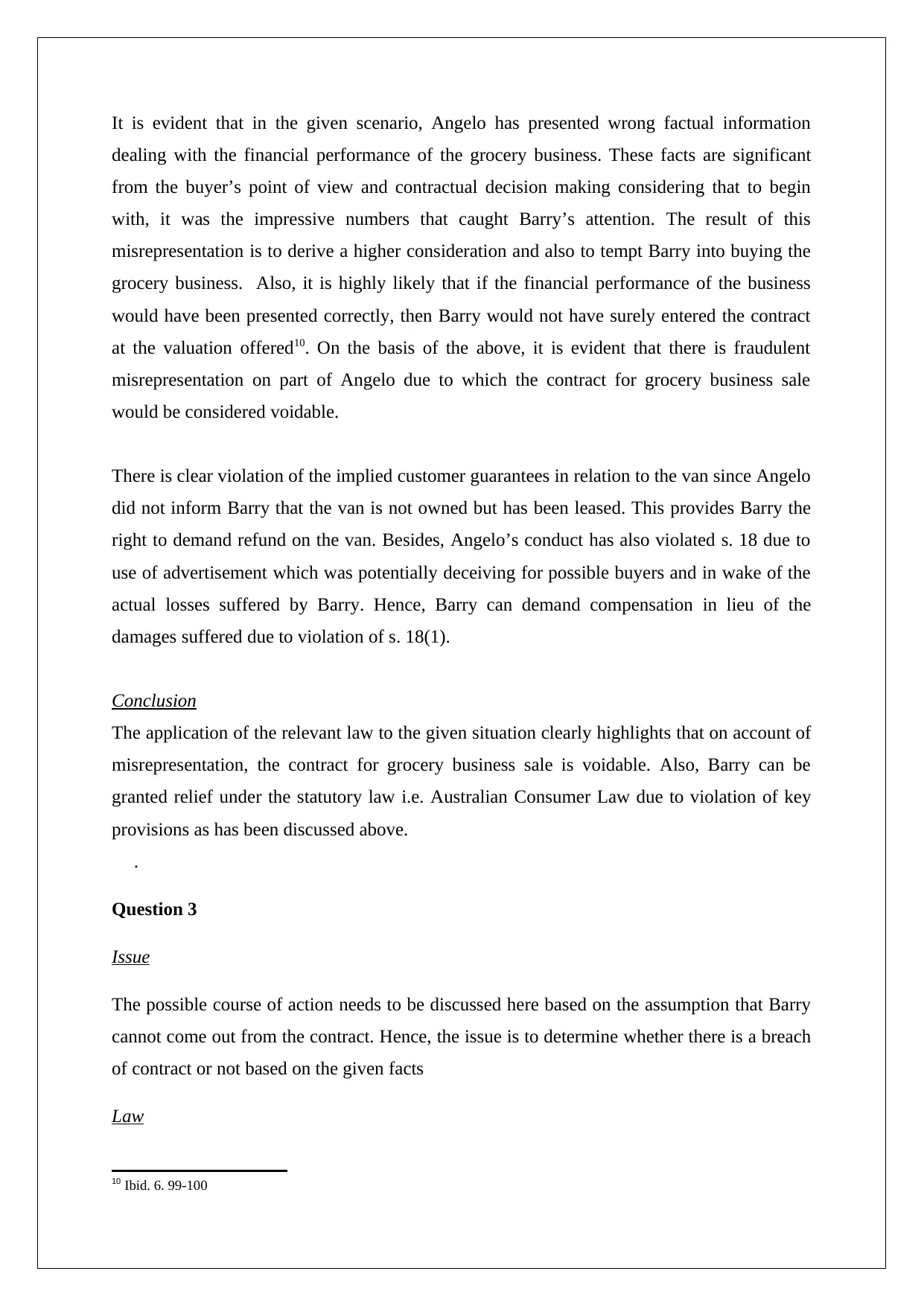
It is evident that in the given scenario, Angelo has presented wrong factual information
dealing with the financial performance of the grocery business. These facts are significant
from the buyer’s point of view and contractual decision making considering that to begin
with, it was the impressive numbers that caught Barry’s attention. The result of this
misrepresentation is to derive a higher consideration and also to tempt Barry into buying the
grocery business. Also, it is highly likely that if the financial performance of the business
would have been presented correctly, then Barry would not have surely entered the contract
at the valuation offered10. On the basis of the above, it is evident that there is fraudulent
misrepresentation on part of Angelo due to which the contract for grocery business sale
would be considered voidable.
There is clear violation of the implied customer guarantees in relation to the van since Angelo
did not inform Barry that the van is not owned but has been leased. This provides Barry the
right to demand refund on the van. Besides, Angelo’s conduct has also violated s. 18 due to
use of advertisement which was potentially deceiving for possible buyers and in wake of the
actual losses suffered by Barry. Hence, Barry can demand compensation in lieu of the
damages suffered due to violation of s. 18(1).
Conclusion
The application of the relevant law to the given situation clearly highlights that on account of
misrepresentation, the contract for grocery business sale is voidable. Also, Barry can be
granted relief under the statutory law i.e. Australian Consumer Law due to violation of key
provisions as has been discussed above.
.
Question 3
Issue
The possible course of action needs to be discussed here based on the assumption that Barry
cannot come out from the contract. Hence, the issue is to determine whether there is a breach
of contract or not based on the given facts
Law
10 Ibid. 6. 99-100
dealing with the financial performance of the grocery business. These facts are significant
from the buyer’s point of view and contractual decision making considering that to begin
with, it was the impressive numbers that caught Barry’s attention. The result of this
misrepresentation is to derive a higher consideration and also to tempt Barry into buying the
grocery business. Also, it is highly likely that if the financial performance of the business
would have been presented correctly, then Barry would not have surely entered the contract
at the valuation offered10. On the basis of the above, it is evident that there is fraudulent
misrepresentation on part of Angelo due to which the contract for grocery business sale
would be considered voidable.
There is clear violation of the implied customer guarantees in relation to the van since Angelo
did not inform Barry that the van is not owned but has been leased. This provides Barry the
right to demand refund on the van. Besides, Angelo’s conduct has also violated s. 18 due to
use of advertisement which was potentially deceiving for possible buyers and in wake of the
actual losses suffered by Barry. Hence, Barry can demand compensation in lieu of the
damages suffered due to violation of s. 18(1).
Conclusion
The application of the relevant law to the given situation clearly highlights that on account of
misrepresentation, the contract for grocery business sale is voidable. Also, Barry can be
granted relief under the statutory law i.e. Australian Consumer Law due to violation of key
provisions as has been discussed above.
.
Question 3
Issue
The possible course of action needs to be discussed here based on the assumption that Barry
cannot come out from the contract. Hence, the issue is to determine whether there is a breach
of contract or not based on the given facts
Law
10 Ibid. 6. 99-100
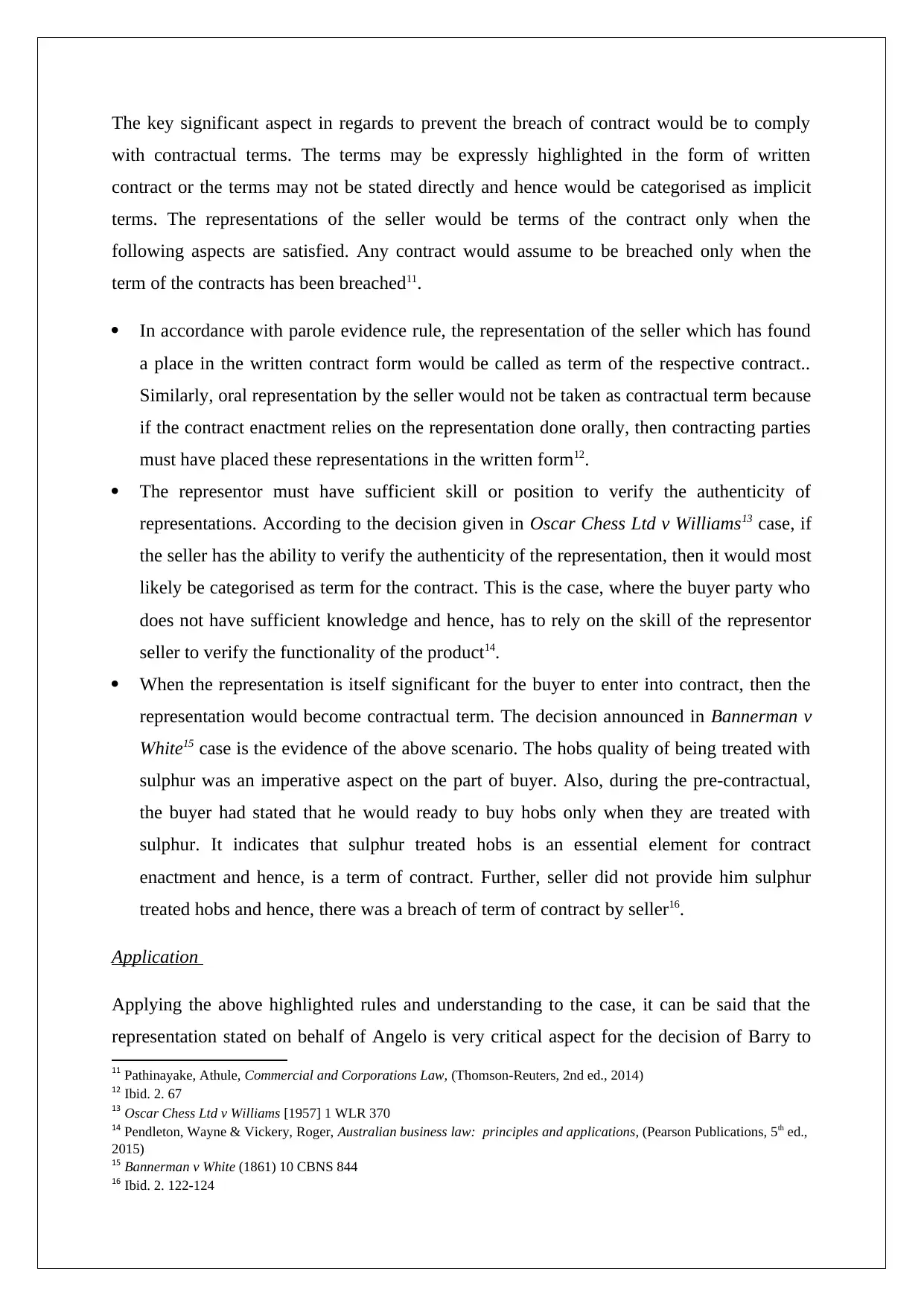
The key significant aspect in regards to prevent the breach of contract would be to comply
with contractual terms. The terms may be expressly highlighted in the form of written
contract or the terms may not be stated directly and hence would be categorised as implicit
terms. The representations of the seller would be terms of the contract only when the
following aspects are satisfied. Any contract would assume to be breached only when the
term of the contracts has been breached11.
In accordance with parole evidence rule, the representation of the seller which has found
a place in the written contract form would be called as term of the respective contract..
Similarly, oral representation by the seller would not be taken as contractual term because
if the contract enactment relies on the representation done orally, then contracting parties
must have placed these representations in the written form12.
The representor must have sufficient skill or position to verify the authenticity of
representations. According to the decision given in Oscar Chess Ltd v Williams13 case, if
the seller has the ability to verify the authenticity of the representation, then it would most
likely be categorised as term for the contract. This is the case, where the buyer party who
does not have sufficient knowledge and hence, has to rely on the skill of the representor
seller to verify the functionality of the product14.
When the representation is itself significant for the buyer to enter into contract, then the
representation would become contractual term. The decision announced in Bannerman v
White15 case is the evidence of the above scenario. The hobs quality of being treated with
sulphur was an imperative aspect on the part of buyer. Also, during the pre-contractual,
the buyer had stated that he would ready to buy hobs only when they are treated with
sulphur. It indicates that sulphur treated hobs is an essential element for contract
enactment and hence, is a term of contract. Further, seller did not provide him sulphur
treated hobs and hence, there was a breach of term of contract by seller16.
Application
Applying the above highlighted rules and understanding to the case, it can be said that the
representation stated on behalf of Angelo is very critical aspect for the decision of Barry to
11 Pathinayake, Athule, Commercial and Corporations Law, (Thomson-Reuters, 2nd ed., 2014)
12 Ibid. 2. 67
13 Oscar Chess Ltd v Williams [1957] 1 WLR 370
14 Pendleton, Wayne & Vickery, Roger, Australian business law: principles and applications, (Pearson Publications, 5th ed.,
2015)
15 Bannerman v White (1861) 10 CBNS 844
16 Ibid. 2. 122-124
with contractual terms. The terms may be expressly highlighted in the form of written
contract or the terms may not be stated directly and hence would be categorised as implicit
terms. The representations of the seller would be terms of the contract only when the
following aspects are satisfied. Any contract would assume to be breached only when the
term of the contracts has been breached11.
In accordance with parole evidence rule, the representation of the seller which has found
a place in the written contract form would be called as term of the respective contract..
Similarly, oral representation by the seller would not be taken as contractual term because
if the contract enactment relies on the representation done orally, then contracting parties
must have placed these representations in the written form12.
The representor must have sufficient skill or position to verify the authenticity of
representations. According to the decision given in Oscar Chess Ltd v Williams13 case, if
the seller has the ability to verify the authenticity of the representation, then it would most
likely be categorised as term for the contract. This is the case, where the buyer party who
does not have sufficient knowledge and hence, has to rely on the skill of the representor
seller to verify the functionality of the product14.
When the representation is itself significant for the buyer to enter into contract, then the
representation would become contractual term. The decision announced in Bannerman v
White15 case is the evidence of the above scenario. The hobs quality of being treated with
sulphur was an imperative aspect on the part of buyer. Also, during the pre-contractual,
the buyer had stated that he would ready to buy hobs only when they are treated with
sulphur. It indicates that sulphur treated hobs is an essential element for contract
enactment and hence, is a term of contract. Further, seller did not provide him sulphur
treated hobs and hence, there was a breach of term of contract by seller16.
Application
Applying the above highlighted rules and understanding to the case, it can be said that the
representation stated on behalf of Angelo is very critical aspect for the decision of Barry to
11 Pathinayake, Athule, Commercial and Corporations Law, (Thomson-Reuters, 2nd ed., 2014)
12 Ibid. 2. 67
13 Oscar Chess Ltd v Williams [1957] 1 WLR 370
14 Pendleton, Wayne & Vickery, Roger, Australian business law: principles and applications, (Pearson Publications, 5th ed.,
2015)
15 Bannerman v White (1861) 10 CBNS 844
16 Ibid. 2. 122-124
⊘ This is a preview!⊘
Do you want full access?
Subscribe today to unlock all pages.

Trusted by 1+ million students worldwide
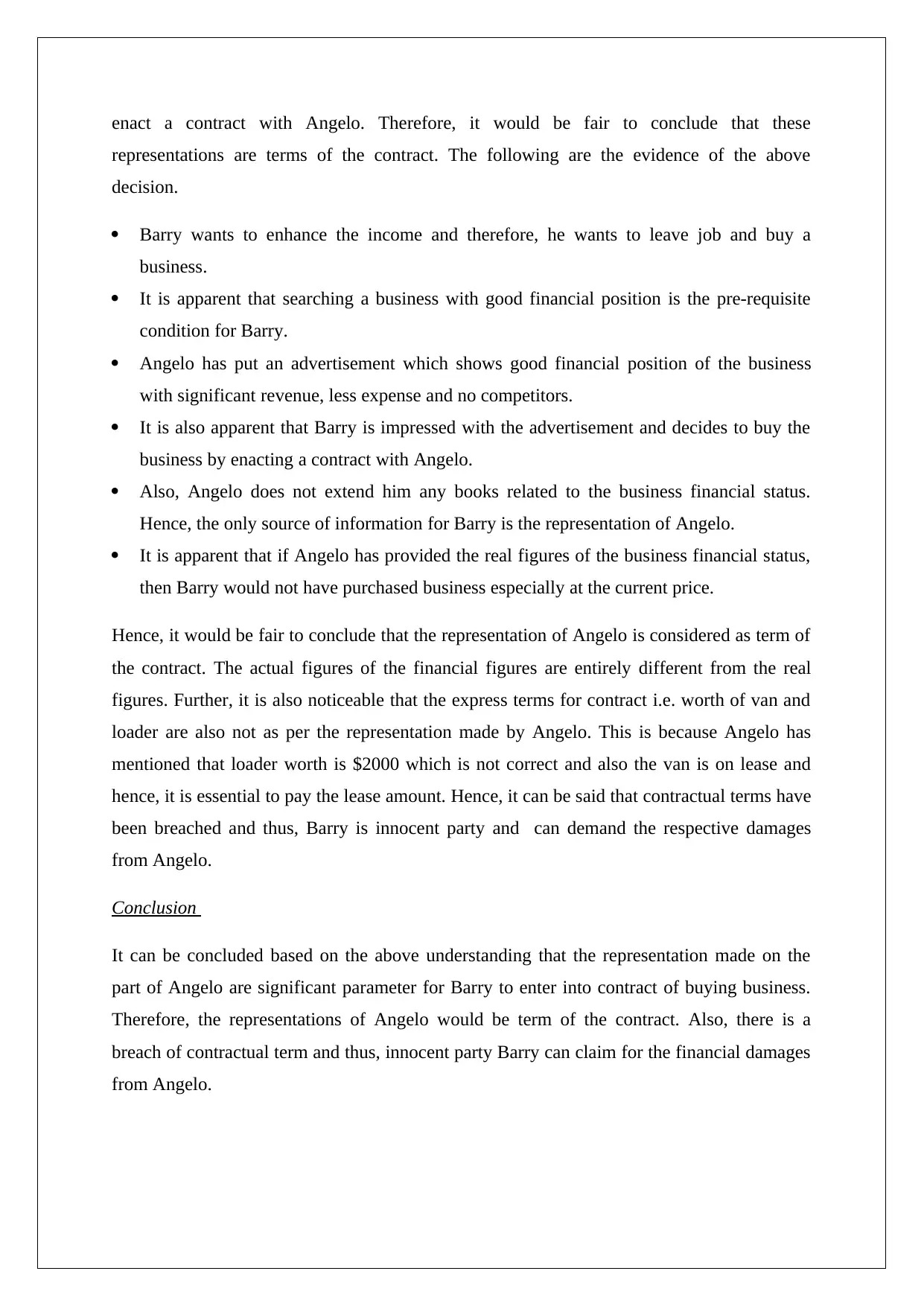
enact a contract with Angelo. Therefore, it would be fair to conclude that these
representations are terms of the contract. The following are the evidence of the above
decision.
Barry wants to enhance the income and therefore, he wants to leave job and buy a
business.
It is apparent that searching a business with good financial position is the pre-requisite
condition for Barry.
Angelo has put an advertisement which shows good financial position of the business
with significant revenue, less expense and no competitors.
It is also apparent that Barry is impressed with the advertisement and decides to buy the
business by enacting a contract with Angelo.
Also, Angelo does not extend him any books related to the business financial status.
Hence, the only source of information for Barry is the representation of Angelo.
It is apparent that if Angelo has provided the real figures of the business financial status,
then Barry would not have purchased business especially at the current price.
Hence, it would be fair to conclude that the representation of Angelo is considered as term of
the contract. The actual figures of the financial figures are entirely different from the real
figures. Further, it is also noticeable that the express terms for contract i.e. worth of van and
loader are also not as per the representation made by Angelo. This is because Angelo has
mentioned that loader worth is $2000 which is not correct and also the van is on lease and
hence, it is essential to pay the lease amount. Hence, it can be said that contractual terms have
been breached and thus, Barry is innocent party and can demand the respective damages
from Angelo.
Conclusion
It can be concluded based on the above understanding that the representation made on the
part of Angelo are significant parameter for Barry to enter into contract of buying business.
Therefore, the representations of Angelo would be term of the contract. Also, there is a
breach of contractual term and thus, innocent party Barry can claim for the financial damages
from Angelo.
representations are terms of the contract. The following are the evidence of the above
decision.
Barry wants to enhance the income and therefore, he wants to leave job and buy a
business.
It is apparent that searching a business with good financial position is the pre-requisite
condition for Barry.
Angelo has put an advertisement which shows good financial position of the business
with significant revenue, less expense and no competitors.
It is also apparent that Barry is impressed with the advertisement and decides to buy the
business by enacting a contract with Angelo.
Also, Angelo does not extend him any books related to the business financial status.
Hence, the only source of information for Barry is the representation of Angelo.
It is apparent that if Angelo has provided the real figures of the business financial status,
then Barry would not have purchased business especially at the current price.
Hence, it would be fair to conclude that the representation of Angelo is considered as term of
the contract. The actual figures of the financial figures are entirely different from the real
figures. Further, it is also noticeable that the express terms for contract i.e. worth of van and
loader are also not as per the representation made by Angelo. This is because Angelo has
mentioned that loader worth is $2000 which is not correct and also the van is on lease and
hence, it is essential to pay the lease amount. Hence, it can be said that contractual terms have
been breached and thus, Barry is innocent party and can demand the respective damages
from Angelo.
Conclusion
It can be concluded based on the above understanding that the representation made on the
part of Angelo are significant parameter for Barry to enter into contract of buying business.
Therefore, the representations of Angelo would be term of the contract. Also, there is a
breach of contractual term and thus, innocent party Barry can claim for the financial damages
from Angelo.
1 out of 7
Related Documents
Your All-in-One AI-Powered Toolkit for Academic Success.
+13062052269
info@desklib.com
Available 24*7 on WhatsApp / Email
![[object Object]](/_next/static/media/star-bottom.7253800d.svg)
Unlock your academic potential
Copyright © 2020–2026 A2Z Services. All Rights Reserved. Developed and managed by ZUCOL.





